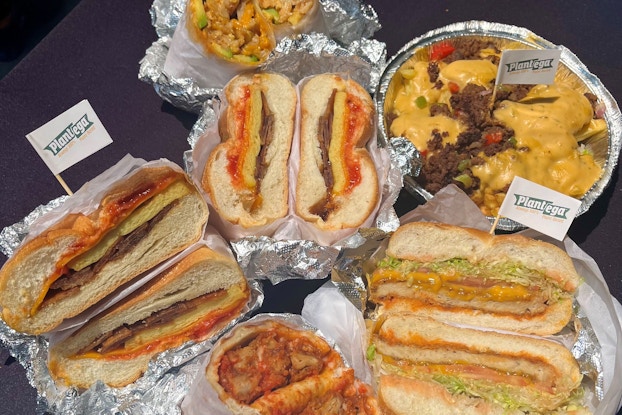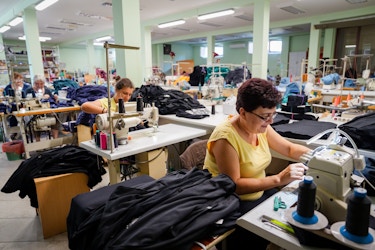
Why it matters:
- By introducing plant-based versions of favorite deli items in New York City's familiar "bodega" grocery/convenience store settings, Plantega brings food options to new mainstream (and sometimes underserved) markets while targeting "plant-based curious" consumers.
- Small independent stores benefit from increased buying power and access to distributors through Plantega's model.
- New food brands that struggle with retail and food service distribution have a built-in audience of over 50 deli-within-a-deli Plantega locations, plus field marketing support.
A pandemic-era realization led to the creation of Plantega, an innovative deli-within-a-deli concept. During stay-at-home mandates, New York City was ordering restaurants closed to the public, but declared "bodegas" essential businesses, recognizing their place in residents' daily lives.
These iconic NYC corner grocers were established by Puerto Ricans who began migrating to the city in large numbers in the 1920s after the island became part of the U.S.
A century later, Nil Zacharias was advising in the food industry and mulling a plant-based endeavor. In 2020, plant-based products were enjoying a sales boom with much innovation and investment dollars hitting the market. As a former New Yorker, Zacharias knew that plant-based options were practically nonexistent in bodegas and conceived of an idea to change that.
"In some neighborhoods, bodegas outnumber grocery stores," he said. "We could reach consumers in an environment they were used to rather than expecting them to go somewhere else like Whole Foods for plant-based food."
The market for plant-based foods in the U.S. is solid, generating $8.1 billion in 2023, reported The Good Food Institute, a nonprofit think tank advancing alternative proteins. Still, just 4% and 1% of the population identify as vegetarian or vegan, respectively, according to Gallup's Consumption Habits poll, leaving a host of potential opportunities with the plant-based curious.
For Plantega's part, "We want to reach meat eaters or flexitarians," Zacharias said. "Our consumer tends to be younger, ages 18 to 35, and they don't want the animal version of their bodega favorite every day. Maybe once or twice a week, they'll order plant-based."
Democratizing plant-based options via a turnkey, plant-based menu for bodegas
Zacharias envisioned Plantega as an umbrella brand partnering with select plant-based products and, at first, piloted it as an in-store branded display. He quickly realized that bodega shoppers grab essentials rather than seek product discovery and turned his attention to menu items.
By the end of its first year in 2021, Plantega was in about 12 bodegas and has now grown to 51. The company provides a turnkey plant-based menu to existing delis, developing recipes for classic bodega favorites like bacon, egg, and cheese, chopped cheese, and chicken sandwiches, burgers, subs, and burritos. Plantega's menu reimagines these classics with plant-based ingredients from the 11 brands in its portfolio: Karana, Numu, Umaro, Fabalish, Black Sheep Foods, Prime Roots, Daring, Wayfare, Abbotts, Zero Egg, and Stockeld Dreamery.
'The food industry creates barriers to get new products in front of customers,' Zacharias said, but partnering with Plantega gets them placement in 51 stores. Plantega features all brands in their field marketing, including sampling events; content, including recipe photos and videos; and it gives them access to anecdotal customer feedback to help grow their presence with consumers.
Zacharias considered opening stand-alone plant-based bodegas but decided to empower independents to meet growing demand.
"People say diet is about making different choices, but not everyone has the same choices. Most people will say a lack of options stops them from trying plant-based [food]. We want to democratize access."
Plantega is in bodegas throughout the five boroughs, plus White Plains and Yonkers. While most of the locations are in Manhattan and Brooklyn, popular ones are operating in neighborhoods like Jamaica, Queens, and in the Bronx.
"It's not only people in high-income areas that buy," said Zacharias. "People in every borough are making the choice, and the common thread is they enjoy having the option."
[Read more: Innovation and Artisan Options Driving Opportunity in Adult Nonalcoholic Beverages]
How the Plantega model works
In addition to providing the menu, Plantega trains deli cooks on how to prepare the plant-based ingredients, does quality control, supplies in-store signage to promote menu items, and onboards each bodega for online delivery via Uber Eats, Grubhub, and DoorDash. The menu roster includes 14 in-store offerings and 40 available on delivery apps.
"We make it easy for bodega owners," said Zacharias, pointing out that the recipes are familiar, and they can use existing products like bread, tomatoes, and lettuce on the sandwiches.
"It helps owners do what they want to do: maximize their kitchens and their labor costs and attract more customers."

To create plant-based options that replicate their traditional counterparts, when sourcing products, Plantega prioritizes taste and functionality related to specific menu items. Cheese, for example, must melt properly in a chopped cheese sandwich to be authentic.
Zacharias occasionally switches out a brand or adds new items judiciously. While taste is paramount, Plantega seeks out clean ingredients like jackfruit for burgers and red seaweed for bacon.
Brands pay an annual participation fee and typically sign one- or two-year contracts. Plantega essentially acts as a value-added broker, facilitating orders through a distributor, Ace Natural.
Ease of use and accessibility are the main benefits for Plantega's stakeholders.
"It's hard for the independent operator to work with a distributor for a small order. Plantega makes it easy for them to access new brands," Zacharias explained. "When they run out, Plantega delivers more through the distributor. All they have to do is prepare and sell the food, and they can sell it at higher margins."
Plantega does not make anything on sales at bodegas but earns a commission from Ace Natural every time bodegas place an order. Orders via delivery apps are a 50-50 split between Plantega and the bodega.
Exposure is key for brands in the Plantega portfolio, many of which are startups.
"The food industry creates barriers to get new products in front of customers," Zacharias said, but partnering with Plantega gets them placement in 51 stores. Plantega features all brands in their field marketing, including sampling events; content, including recipe photos and videos; and it gives them access to anecdotal customer feedback to help grow their presence with consumers. Plus, brands earn money when they are reordered from the distributor.
[Read more: Trend Forecasters on the 6 Consumer Trends Set to Impact Business in 2025]
An expansion into plant-based catering for office spaces and large events
Sales have doubled every year from 2021 to 2023, with 25% growth in 2024. Last year Plantega concentrated on optimizing bodega locations.
"We don't need to be in every bodega in New York, we need to be in the most effective ones," Zacharias noted.
Plantega sales account for 20% to 25% of total bodega deli counter sales, and that number can go as high as 50% on weekends, when including delivery and in-store purchases. Manhattan especially sees high weekend sales, said Zacharias.
Plantega plans to increase delivery business. In August 2024 the company opened a flagship kitchen in Brooklyn that covers delivery orders for the borough, currently comprising 30% to 35% of all Plantega deliveries, but now with capacity to grow volume.
The new space also let Plantega expand into catering across the city for office spaces or larger events, an area the company has fielded inquiries about since its launch. And more space means more room to experiment, expanding the classic menu with new recipes for catering.
While the new kitchen accounts for a small percentage of total sales, if successful, it opens potential for more kitchens to accommodate delivery in cities outside New York.
"We can recreate the bodega menu in other places," explained Zacharias, who is also contemplating future stand-alone institutional food service locations at colleges or universities.
'Showcase the product in a way that does not alienate them.'
Zacharias advises companies entering the plant-based space to begin with the end customer in mind.
"Think about the emotional and cultural ties to food. Ask yourself, how do I make [my product] compelling enough for a meat-eater to spend money on a plant-based choice?"
That's a pretty high bar, he cautioned.
"You have years of cultural programming that's tough to break. The challenge is to get repeat customers, not someone who tries it once and never again. You need to showcase the product in a way that does not alienate them or asks them to take such a leap that they dismiss it."
CO— aims to bring you inspiration from leading respected experts. However, before making any business decision, you should consult a professional who can advise you based on your individual situation.

Interested in a small business membership?
Find out how the U.S. Chamber of Commerce can help your company grow and thrive in today's rapidly-evolving business environment. Connect with our team to learn how a small business membership can benefit your bottom line and help you achieve your goals.







